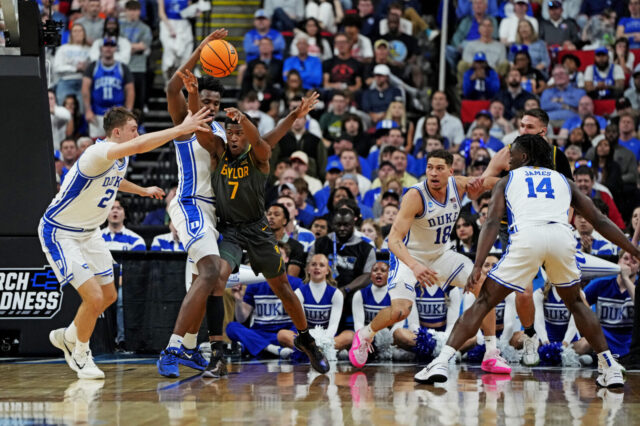Stiffs Prospect Watch continues with Wake Forest power forward/small ball center John Collins, an interesting player on a rare trajectory. His skills around the basket offensively are high quality, his athleticism makes him an above the rim threat, and he has shown defensive potential. He shares a last name with another favorite prospect of mine, Zach Collins, and his position is similar. Both guys showed incredible efficiency this year, but John demonstrated it in a larger role as a starter.
John Collins was one of the leaders for the Demon Deacons this season, and while Wake Forest didn’t make the tournament as more than a play-in, they were a tough out. He had some incredible performances over the course of the season, and three truly stood out:
- @ Duke – 31 points, 15 rebounds, one steal, 13/18 from the field
- @ Boston College – 26 points, 16 rebounds, one steal, three blocks, 8/10 from the field
- v.s. Kansas State (elimination game) – 26 points, nine rebounds, 9/13 from the field, 8/8 from the free throw line
A guy with that kind of volume and efficiency really stands out. In a weaker draft, Collins would be a top 10 selection. In this draft? He may fall to 20.
There are a variety of needs for the Denver Nuggets to fill during the coming offseason, and the most pressing one is clearly defense. Let’s start with the bad first: John Collins is a raw defender. At 19 years old, he hasn’t fully grasped the concept of sitting down in a stance and using his body effectively to wall off the rim. Players he defends will drive right around him sometimes, and while he has the athleticism to recover, players in the NBA care very little about that.
He doesn’t generate more than an average number of blocks, and his steal numbers are very low. As a team, the Wake Forest Demon Deacons ranked 176th in the nation in adjusted defensive efficiency, according to KenPom. For a team with a stud NBA prospect patrolling the paint, that’s really bad. By comparison, here are the rankings of the teams from other top big man prospects:
Adjusted Defensive Efficiency by teams of high ranking prospects:
- Zach Collins, Gonzaga – 1st
- Lauri Markannen, Arizona – 28th
- Jarrett Allen, Texas – 21st
- Justin Patton, Creighton – 46th
- Ike Anigbogu, UCLA – 84th
- Ivan Rabb, California – 14th
The team as a whole ranked 227th in steals per game in the nation, which is incredibly bad. Not all of that can be considered Collins’ fault, but there were a variety of times when he caught a case of “I can be lazy for this possession so I can have more stamina on offense” syndrome. The Nuggets don’t need more of that mentality on their roster.
Still, he does possess good skills and tools defensively. He rebounds very well, especially for a power forward. He had the fifth best offensive rebounding percentage in the country for players who played his amount of minutes, along with the 22nd best defensive rebounding percentage. He demonstrates a great ability to box out, and the less offensive rebounds Denver allows, the better for their defensive efficiency.
Now to get to the fun part about Collins: his offense. The only place to start with Collins’ offensive game right now is that it is limited, but what he does, he did the best possible job in college basketball. Take a look at his numbers and how they stack up in college basketball this season:
| Statistic | Rank Nationally | |
|---|---|---|
| Points | 19.2 | 58th |
| Rebounds | 9.8 | 21st |
| Field Goal % | 62.2 | 21st |
| True Shooting % | 65.8 | 20th |
| PER | 35.9 | 1st |
Combined with the volume of being a starter and first or second option on an ACC team, Collins provided some of the best efficiency in college basketball. Leading the nation in so many categories in the toughest conference in college basketball is a great resume builder.
What adds to Collins’ resume is his projectable NBA skills. His hands are very good as a big man, with the ability to make tough catches from difficult angles. He also makes a variety of his baskets from awkward angles, in much of the same way that Nikola Jokic does. No matter the situation, Collins is able to put up a quality shot in traffic.
Collins shot 72.9 percent from the free throw line on 314 attempts in his two years at Wake Forest. After shooting 69.1 percent on low volume in year 1, he shot 74.5 percent in year two on twice the attempts. In College Reference’s database, there are 164 players who have matched Collins’ 19 points and 9 rebounds per game, and he ranks 55th in free throw percentage among those players.
This is to say that he has a projectable shooting stroke. He shows comfort shooting midrange jump shots, and I believe he will be comfortable shooting threes at some point in his career. He doesn’t have to shoot from out there in order to be effective, but if he CAN, then his ceiling gets much higher.
At this point though, Collins has the touch inside that is reminiscent of both Jokic and Kenneth Faried. His aggressiveness on the offensive glass helps put him in great position for little taps and bigger put back dunks. Both are in his repertoire, and if his touch translates to the next level, he could put up some extremely efficient seasons around the rim. This touch also translates in the pick and roll and in his post game, where he’s showed flashes of simple, yet effective moves. I have visions of him catching passes above the rim on the roll, while also being able to score from the post when the defense switches that action.
Overall, the final call to make is on his fit with Jokic and the Nuggets long term. Ideally, Collins projects as a power forward who works best in the paint but can step outside and be a threat as a jump shooter on occasion. Defensively, moving to power forward will be in his best interest, as he’s shown the mobility and rim protection necessary to be a weak side shot blocker, but not necessarily the anchor in the middle.
Wake Forest wasn’t successful on defense with him as a center, but offensively, they were 7th in the nation. In Denver, Collins would assume the Kenneth Faried role as a player who operates inside, makes shots at an efficient rate, and rebounds ferociously. If he develops a jump shot, that would be ideal. If not, he would still be an efficient offensive weapon.
If I’m the Nuggets, I look in a different direction at power forward though. With the league trending smaller, the power forward must be able to switch on defense and contain dribble penetration from opposing guards. I don’t know if Collins has that in him on 34 minutes a night. If the Nuggets are assuming he comes off the bench, then this would be a fine selection, but there are other players who could provide more long term impact.
Still, John Collins is a player, and if the right team selects him, I wouldn’t be surprised to see him making a Chris Bosh level of impact if he develops a jump shot.
Stiffs Prospects to Watch
This content is no longer available.


